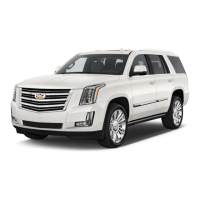Do you have a question about the Cadillac XTS 2018 and is the answer not in the manual?
Guide on how to effectively locate information within the manual using the index and other features.
Explains the meaning of hazard messages found on vehicle labels and in the manual to avoid risks.
Explains the meaning of safety symbols used on vehicle labels and in the manual for quick identification.
Provides a chart of common vehicle symbols and their meanings for quick reference.
Overview of the instrument panel, including its layout and components.
Provides a brief overview of important features for initial vehicle operation and driver information.
Instructions for adjusting front seats, including power, lumbar, and bolster support features.
Information on proper seat belt usage, including how to wear them and safety system checks.
Information on exterior lamp controls, including automatic operation and headlamp features.
Explanation of climate control systems, buttons, and display for adjusting heating, cooling, and ventilation.
Overview of the infotainment system, covering radio, audio, phone, and navigation features.
Instructions on how to operate cruise control, including setting speed and disengaging the system.
Explanation of the FCA system designed to help avoid or reduce harm from front-end crashes.
Details on parking assist features like RPA and FPA to help with parking maneuvers.
Information on TCS and StabiliTrak systems to assist with vehicle control in difficult conditions.
Explanation of the Tire Pressure Monitor System (TPMS) and its warning indicators.
Information on keys, remote keyless entry system, door locks, and lockout protection features.
Details on power windows, their operation, and automatic reversal system features.
Instructions on operating the sunroof and sunshade, including comfort stop and express functions.
Information on front and rear head restraints, their adjustment, removal, and proper installation.
Details on power seat adjustment, lumbar, thigh support, reclining seatbacks, and memory features.
Comprehensive guide on seat belt usage, why they work, and proper wearing techniques.
Explanation of airbag types, locations, inflation, restraint, and system checks for safety.
Guidance on selecting and using child restraints, including older children, infants, and proper installation.
Overview of storage compartments like glove box, armrest, and center console for organized storage.
Details on accessing and using storage located within the instrument panel.
Information on using cargo tie-downs and management systems to secure loads in the vehicle.
Covers steering wheel adjustment, controls, horn, wipers, power outlets, and wireless charging.
Explanation of various warning lights, gauges, and indicators on the instrument cluster.
Detailed view and explanation of the instrument cluster displays and configurations.
Information on the Driver Information Center (DIC) and Head-Up Display (HUD) features.
Explains various vehicle messages displayed to indicate status or required actions.
Options for personalizing vehicle features like climate, audio, and lighting settings.
Instructions for programming and operating the universal remote system for garage doors and home devices.
Details on exterior lamp controls, automatic headlamp system, and IntelliBeam system.
Information on instrument panel illumination, courtesy lamps, dome lamps, and reading lamps.
Explanation of entry lighting, exit lighting, battery power protection, and exterior lighting battery saver.
Overview of the infotainment system, covering radio, audio, phone, and navigation.
Explanation of dual automatic climate control and rear climate control systems.
Details on adjustable air vents, their location, and how to control airflow direction.
Information on passenger compartment air filter replacement and general service procedures.
Guidance on distracted driving, defensive driving, drunk driving, and vehicle control basics.
Information on new vehicle break-in, ignition positions, starting the engine, and retained accessory power.
Details on automatic transmission operation, manual mode, and tap shift controls.
Explanation of ABS, electric parking brake, brake assist, and hill start assist features.
Instructions on setting, increasing/reducing speed, resuming, and disengaging cruise control.
Overview of features like FCA, LDW, LKA, SBZA, FAB, and parking assist systems.
Information on recommended fuel types, prohibited fuels, and filling the tank procedures.
General towing information, driving characteristics, and safety tips for towing trailers.
Cautionary notes on adding electrical equipment and its potential impact on vehicle systems.
General advice on vehicle care, including California warnings and accessories.
Guidance on performing your own service work and checks on various vehicle systems.
Instructions on how to open and close the vehicle's hood safely.
Visual guide to the engine compartment, identifying key components for different engine types.
Steps for checking engine oil level, when to add oil, and selecting the right engine oil.
Instructions on what to use, how to add washer fluid, and cautions for proper usage.
Information on brake pad wear indicators, brake fluid checking, and replacement parts.
Details on the original equipment battery, its maintenance, and safety warnings.
Procedure for checking the starter switch and ensuring safe vehicle operation during inspection.
Step-by-step instructions for replacing windshield wiper blades correctly.
Guidance on replacing the windshield, especially for HUD systems and driver assistance cameras.
Information on gas struts for hood, trunk, and liftgate assistance, and safety precautions.
Procedures for replacing various bulbs, including LED lighting and back-up lamps.
Explanation of electrical system overload, fuses, circuit breakers, and wiring.
Diagram and usage guide for fuses located in the engine compartment.
Diagram and usage guide for fuses located in the instrument panel.
Location and purpose of the fuse block in the rear compartment of the vehicle.
Information on tire types, maintenance, replacement, and safety warnings for wheels and tires.
Importance of correct tire pressure and cautions for under/overinflation.
Explanation of the TPMS, its sensors, and operation for monitoring tire pressure.
Guidelines for rotating tires to achieve uniform wear and maintain vehicle performance.
Factors affecting tire wear and indicators for when tires need replacement.
Recommendations for selecting and purchasing replacement tires, including TPC Spec.
Explanation of UTQG system for grading tires based on treadwear, traction, and temperature.
Overview of required maintenance for the vehicle to protect its value and prevent major repair expenses.
Details on the premium maintenance program, covering select services and requirements.
Schedule of owner checks and services required at different intervals for optimal vehicle condition.
Services specific to certain vehicle uses, like commercial use or underbody flushing.
Guidance on additional services and checks to maintain vehicle performance and avoid future repairs.
Information on Vehicle Identification Number (VIN), model designation, and paint information.
Details on labels in the trunk and B-pillar containing VIN, model, paint, and production options.
Capacities and specifications for the vehicle, including engine, fluids, fuel tank, and wheel nut torque.
Technical data on engine types, VIN codes, and spark plug gaps for proper engine maintenance.
Diagrams showing the routing of drive belts for AWD and FWD accessory drives.
Details on customer satisfaction procedures and how to address concerns with dealerships.
Information on how vehicle data is recorded, used, and protected, including EDRs and OnStar.
Procedures for reporting safety defects to government agencies and General Motors.
General introduction to the OnStar system, its capabilities, and status lights.
Details on Emergency, Security, Navigation, Connections, and Diagnostics services offered by OnStar.
Information on OnStar Smart Driver, In-Vehicle Audio Messages, and transferring service.
| Brand | Cadillac |
|---|---|
| Model | XTS 2018 |
| Category | Automobile |
| Language | English |











